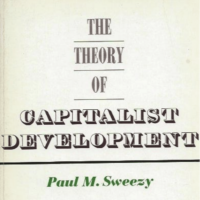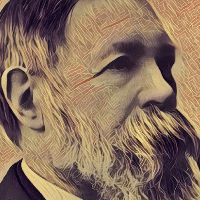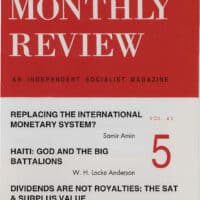-
Fascism, from The Theory of Capitalist Development
Unearthing the chapter on fascism from Paul Sweezy’s The Theory of Capitalist Development (Monthly Review Press, January 1942).
-
The Political Tragedy of Capitalist Rule
Society is made up of parts that work together, sometimes more and sometimes less successfully, to produce its livelihood and reproduce itself.
-
The Puzzle of Financialization
In this reprise from October 1993, Harry Magdoff and Paul Sweezy ask: “Isn’t there anyone around here who understands how this capitalist system works?”
-
End of Cold War Illusions
In this reprint of the February 1994 “Notes from the Editors,” former MR editors Harry Magdoff and Paul M. Sweezy ask: “The United States could not have won a more decisive victory in the Cold War. Why, then, does it continue to act as though the Cold War is still on?”
-
The Triumph of Financial Capital
Financial capital, once cut loose from its original role as a modest helper of a real economy of production to meet human needs, inevitably becomes speculative capital geared solely to its own self-expansion. In earlier times no one ever dreamed that speculative capital, a phenomenon as old as capitalism itself, could grow to dominate a national economy, let alone the whole world. But it has.
-
A Dual Task
As we have pointed out on more than one occasion in this space, the government deficit is far from being a primary trouble spot. In fact it serves as an important counteracting force to the prevailing stagnation. On the other hand, the business community here and abroad sees the deficit, presumably because of its effect […]
-
The Theory of U.S. Foreign Policy — I
United States foreign policy has been generating defeats for well over a decade now but never at such a fast and furious pace as during the last few months. . . . What is the reaction in the American ruling class to this consistent and comprehensive failure of foreign policy? One might expect mounting criticism […]
-
Notes on the Theory of Imperialism
In terms of the total system, these [the dominant classes in the most advanced capitalist countries] are the classes which have the power of initiative: they are, so to speak, the independent variables. The behavior of other classes — including the subordinate classes in the dominant countries as well as both the dominant and the […]
-
The Federal Deficit: The Real Issues
. . . But are the high interest rates that impose such a heavy burden on the budget inevitable? What happened during the Second World War proves beyond a shadow of doubt that they are not. In the war years from 1942 to 1945, the average annual deficit was 23 percent of Gross National Product, […]
-
The Deficit, the Debt, and the Real World
The latest fad in business journalism is to sound the alarm about the United States having become the biggest debtor in the world. This is intended to bring visions of our country sliding into a third world-type debt trap. But even those who don’t draw such dire inferences nevertheless assume that a ballooning U.S. debt […]
-
Listen, Keynesians!
There is a remarkable consensus among economists of all ideological and political persuasions — conservative, liberal, and radical — that capitalist economies must grow to be healthy, and that the key to growth lies in the capital accumulation or savings-and-investment process. Accepting this view, we have long been arguing in effect that capitalism, like living […]
-
About Keynes and Keynesians
Did you ever accept Keynesian economics, or did you go beyond Keynesian economics and feel his approach had lost the essence of what the problem was? One thing you should understand is that Keynesian theory permits an enormous variation in political and ideological positions. Later on what Joan Robinson came to call Bastard Keynesianism […]





